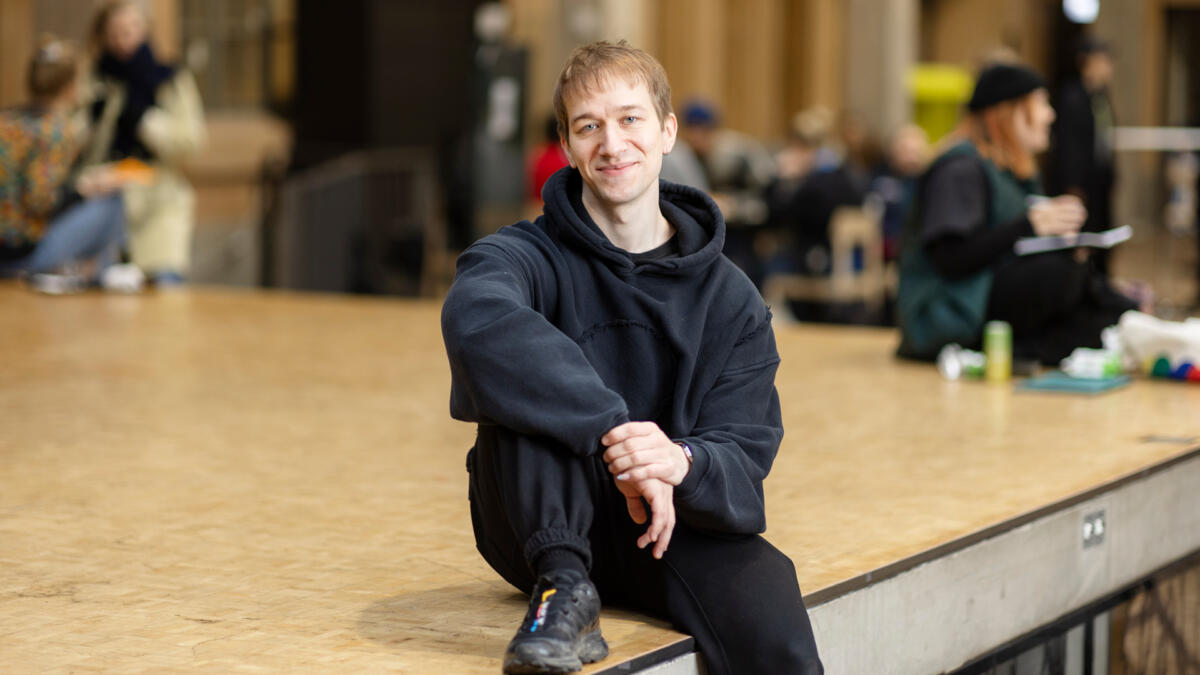Theatre pedagogy student: the master’s programme uses our own perspectives on art as a starting point
Read an interview with Myrsky Ylänen who is studying in the second year of the master’s programme. He feels that he has found many ways of influencing society through teaching practice.

Please tell us about yourself. How did you realise that you wanted to study at Uniarts Helsinki?
I am Myrsky Ylänen, an actor hailing from Lappeenranta. I moved to Helsinki in the early 2010s. I do not have a lower university degree, but my previous acting studies and related work experience qualified me to apply directly to the master’s program. Art as a profession has interested me since I was young, and applying to the Uniarts Helsinki was a clear choice for me. I started my studies in the autumn of 2022, which means that I am currently doing my second academic year in the Master’s Programme in Theatre Pedagogy.
The theatre pedagogue profession interests me because it expands my job description, and it does not eliminate the possibility of working as an actor. On the contrary, teaching and acting support each other in many ways. For example, I can act as the convener of an artistic group, and many theatre teachers also work as directors. At some point in their career, professionals in the performing arts industry want to pass on what they have learned.
Please tell us one thing you remember about your entrance examination.
The application process required attentiveness and familiarisation with the education programme starting already from the preliminary tasks. Despite the exceptional situation created by the Covid-19 restrictions, the entrance exams were carefully organised so that the restrictions did not complicate the structure of the entrance exams too much. I also felt that the exam methods were well justified from a pedagogic point of view. The atmosphere created during the entrance exams differed in a positive way from my previous experiences of university application processes.
What has been the best thing about studying at Uniarts Helsinki?
The best thing about studying is the people. An open discussion culture and high-quality teaching form good foundations for the development of one’s own artistic and social thinking. The creation of friendships and collaborations that cross the borders of the education programs have involved great experiences, and there will certainly be more after graduation.
What has been the most challenging thing about your studies?
External factors have made studying challenging, such as sudden changes in society and the value choices of decision-making bodies in relation to education. The increasing pressure on students in connection with earning a living, graduating, and balancing leisure, study life, and work life consume the individual’s resources even more than before. For understandable reasons, the well-being and exhaustion of university students has become an increasingly topical concern in recent years.
What is your most memorable study experience?
The most memorable courses have included artistic collaboration between the academies of Uniarts Helsinki. Working with different academies has broadened and clarified my own understanding of artistic fields. The teaching internships included in the Master’s Programme in Theatre Pedagogy have included many valuable experiences on the field. They have increased my understanding of the different ways the degree enables me to influence society.
How is internationality reflected in your studies?
In my studies, international elements are best visible in the course offerings. Courses can include, for example, international cooperation between performing arts schools in the Nordic and Baltic countries, visits to various European art festivals, or artistic research that crosses geographical borders. International applicants are also selected for the training programs, which allows you to converse in another language on many courses.
What preconceptions did you have about Uniarts Helsinki? What do you think about them now?
Perhaps I had one prejudice that the Uniarts Helsinki aims to produce graduated artists through a certain pre-defined narrow template. After I got into the university, however, I quickly noticed that one of the goals of our education is to harness our own starting points and perspectives as a force that changes society.
What do you dream of doing after you graduate?
I dream of multidisciplinary artistic-pedagogical work, without forgetting my own acting. The stability brought by teaching enables freer freelance work in the field of performing arts.